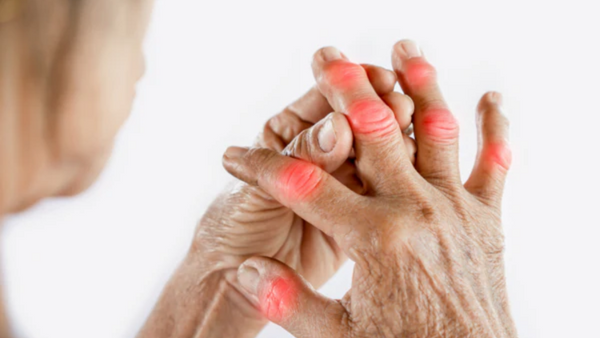Gout is characterized by elevated uric acid levels. This causes uric acid crystals to form and deposit in the joints. This leads to painful inflammation and increases the risk of arthritis, kidney disease and high blood pressure.
High uric acid levels occur when purines accumulate. These are broken down in the body into uric acid
Purines are formed when genetic material (DNA) that we ingest through food is broken down. Purines are found in many foods. Offal, fish, meat, legumes, nuts and seeds are very rich in purines. Eggs, dairy products, potatoes and some vegetables, such as carrots, peppers and tomatoes, are relatively low in purines.
If uric acid levels are high, there is a risk that crystals will form and settle in the joints, causing inflammation and pain.
Gout can be congenital. In the case of congenital kidney failure, uric acid is not excreted effectively enough in the urine. In addition, congenital enzyme defects can increase the formation of uric acid.
But gout usually develops over the course of a person's life. For example, in diabetes, the kidneys are often weakened, meaning that uric acid cannot be excreted as effectively. Some medications can also inhibit the excretion of uric acid.
Gout also regularly causes gout attacks, which manifest themselves as sudden, severe pain in the joints.
Diet plays an important role in gout. Excessive consumption of foods rich in purines can trigger a gout attack.
Temperatures also have an influence. Crystals form more easily in cold temperatures and gout attacks are more likely to occur as a result.

A change in diet plays a key role in the treatment of gout. Medications are also used to reduce inflammation and relieve pain. There are also uric acid-lowering agents that can alleviate symptoms in the long term.
Micronutrients can provide good support for gout therapy.
Vitamin C
Vitamin C increases the excretion of uric acid in the urine. Studies suggest that people with high vitamin C intake have lower uric acid levels. In addition, vitamin C intake appears to reduce the risk of gout. [1]
However, there are no studies yet that have examined whether vitamin C can help with a gout attack.
potassium
Potassium can also increase the excretion of uric acid. [2] Potassium can also improve the solubility of uric acid, which is why the mineral is believed to facilitate the dissolution of kidney stones.
Curcumin
Turmeric is a tried and tested medicinal plant. The active ingredient curcumin is responsible for its effect.
Curcumin affects uric acid levels in two ways: On the one hand, it inhibits the formation of uric acid. On the other hand, it promotes its excretion. [3]

Since curcumin has antioxidant and anti-inflammatory properties, it can probably also protect the joints from damage.
magnesium
Approximately one third of uric acid is excreted in the stool. Since taking magnesium can have a mild laxative effect, it is assumed that magnesium promotes the excretion of uric acid in the stool. [4] Conversely, a high magnesium intake can lower uric acid levels under certain circumstances. However, the studies are not clear on this.
Even though magnesium supplementation for gout is poorly researched, magnesium can easily be deficient in food and a deficiency should be avoided.
zinc
Zinc counteracts oxidative stress, which can be caused by increased uric acid levels.
In addition, zinc appears to be able to protect against elevated uric acid levels. People with a high zinc intake have a lower risk of elevated uric acid levels. [5]
Omega-3 fatty acids
Omega-3 fatty acids have anti-inflammatory effects and can counteract inflammation caused by high uric acid levels.
Unfortunately, the use of omega-3 fatty acids in gout has not been well studied. However, it is known that they can help with inflammatory pain. [6] It is also difficult to meet omega-3 requirements through diet and deficiency is widespread.

Conclusion: Micronutrients can help lower uric acid levels
Micronutrients can effectively support the treatment of gout. For example, they can reduce the formation of uric acid or improve its excretion via the kidneys. They can also counteract inflammation caused by increased uric acid levels.
WE HAVE GOT YOU A 10% VOUCHER FOR OUR
Potassium, Magnesium, Turmeric , Vitamin C , Omega-3 , Zinc & Copper , Zinc
PROVIDED AND HOPE TO BRING YOU JOY WITH IT.
SIMPLY COPY THE FOLLOWING COUPON CODE
AND ENTER IT AT CHECKOUT:
GICHT+V10
To the products
[1] https://www.viktilabs.de/blogs/magazin/zink
[2] https://pubmed.ncbi.nlm.nih.gov/29605825/
[3] https://www.ncbi.nlm.nih.gov/pubmed/27124606
[4] https://pubmed.ncbi.nlm.nih.gov/26536119/

















